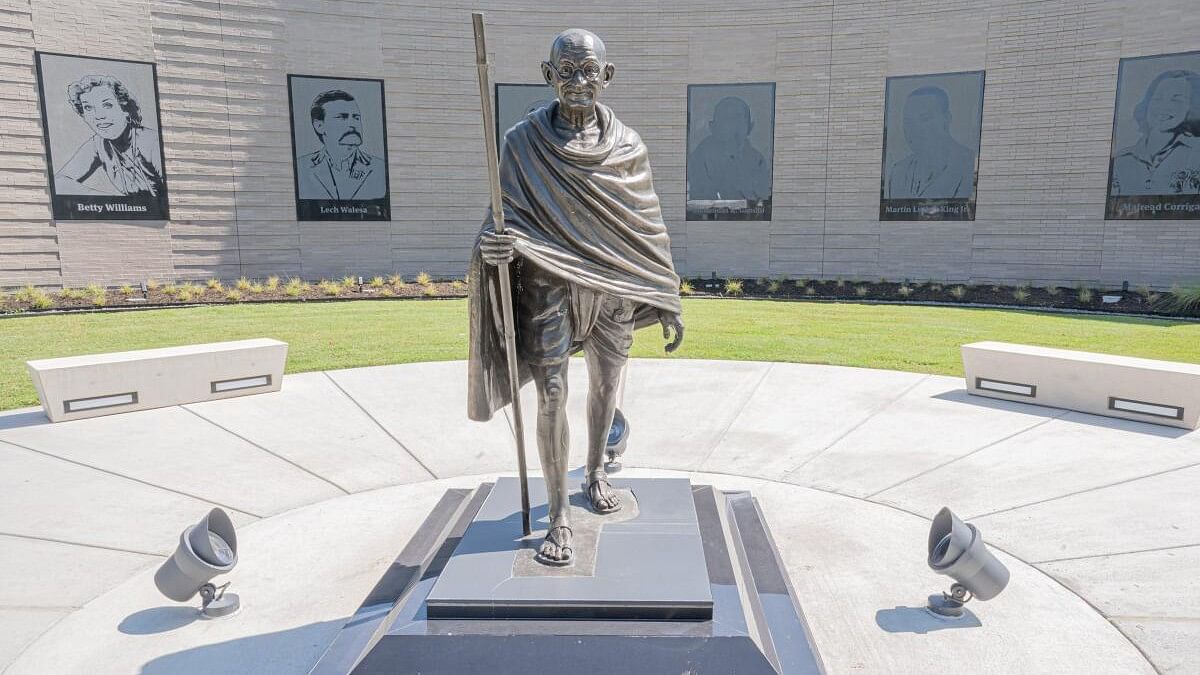
A statue of Mahatma Gandhi.
Credit: PTI Photo
In his book The Life of Mahatma Gandhi, Louis Fischer, a renowned Jewish-American journalist, highlighting Gandhi’s tireless efforts to champion the rights of the Champaran peasants who worked on Indigo plantations, writes: “The Champaran episode did not begin as an act of defiance. It grew out of an attempt to alleviate the distress of large numbers of poor peasants… This was the typical Gandhi pattern—his politics were intertwined with the practical day-to-day problems of the millions. His was not a loyalty to abstractions; it was a loyalty to living, human beings!”
This profound observation by Fischer on the ‘Father of our nation’ underscores Gandhi’s deep love and compassion for the marginalised and impoverished people of India. Gandhi’s devotion to the common man was at the foundation of his freedom movement against the British. In his time and beyond, people the world over marvelled at his connection with the downtrodden. Rabindranath Tagore eloquently affirmed this, writing, “” Mahatma Gandhi came and stood at the door of India’s destitute millions… Who else has so unreservedly accepted the vast masses of the Indian people as his flesh and blood?”
Gandhi ate, dressed, and walked around like the multitudes. Other than his forward thinking and learned understanding, he made no qualms about looking like one of the masses. His humility and solidarity with the masses were reflected in his simple attire—his habitual loincloth and a large white shawl—which he wore even when meeting the King of England. The journalists and cartoonists present at the occasion joined Gandhi in the general air of sartorial amusement. When asked later by a journalist if he had dressed appropriately, Gandhi is reported to have replied with a smirk: “The King had enough on for both of us.”
On another occasion, when Gandhi was questioned scornfully by a British envoy, “How is India doing?” he would reply with deep empathy, “Look at me and you will know how India is doing.” This was the depth of Gandhi’s connection with the poor. He wanted to symbolise the dire conditions faced by the majority of Indians. By his appearance and demeanour, he made a point that his own status was linked with that of the poor and the powerless.
Again, Gandhi’s famous assertion that “There is enough for everyone’s need, but not enough for everyone’s greed” serves as a profound reflection of his economic philosophy that is rooted in a more equitable distribution of resources. This statement not only critiques the huge gap that exists between the rich and the poor but also urges society to re-evaluate its values. Gandhi advocated for a model of economic development that prioritised the needs of the poorest over the accumulation of wealth by the privileged few. His vision of “Sarvodaya,” or the welfare of all, underscored the idea that true progress is not measured by material wealth but by the well-being of the entire society, particularly those at the bottom of the socio-economic ladder.
Throughout his life, Gandhi consistently emphasised the dignity of labour and the importance of self-sufficiency, particularly for rural communities. His promotion of khadi (homespun cloth) was not merely a campaign against British textiles; it was a means to empower local artisans and provide them with a livelihood. By encouraging people to spin their own cloth, he fostered a sense of self-reliance and economic independence, particularly among the poor.
Gandhi’s love for the poor was an integral aspect of his philosophy and activism. Through his actions and poignant assertions regarding needs versus greed, Gandhi articulated a vision of society where the well-being of the poorest was paramount. His commitment to social justice remains a timeless reminder of the need for compassion and equity in the face of systemic inequality.
Through his life of austerity and sensitivity, Gandhi expressed that wealth and status should never overshadow the suffering of the poor. It came from a deep loyalty to living human beings. On his 155th birth anniversary, we’ll do well to honour this supreme loyalty by making it our own in whatever little ways we can. That would be the greatest tribute we can pay our beloved Bapu and the scores of downtrodden who were close to his heart!